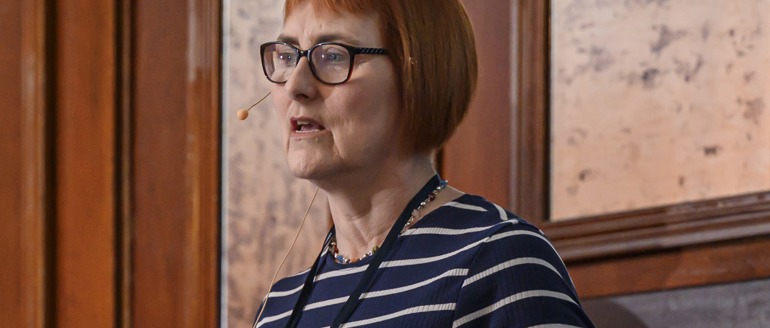Alison's education journey
Alison Armstrong is a Nurse Consultant in Home Ventilation based in Newcastle and BTS Chair of the Education and Training Committee.
Leadership experience
As a nurse consultant, leadership is an instrumental part of my role, and an NMC requirement to meet as one of the four pillars of practice.
In 2022, I was appointed as the first nurse delegate to hold the position of Chair of the British Thoracic Society Education and Training Committee. This is the first time that a non-medical health care professional has held the position of chair across any of the BTS standard committees. It is something I am incredibly proud of and sets a precedent for other nurses and AHPs to consider applying for similar roles.
I have also co-chaired the BTS Nurse SAG, which allowed me to represent nursing in a leadership capacity.
I have been the host of an international long-term ventilation network for the last 18 years (Specialists in Long-term Ventilation at Home - SiLVaH). The focus of this group is to share ideas around practice development, standardisation and service improvement at a local, national and international level.
I am also Chair of Home Mechanical Ventilation in Partnership (HMViP). This is a collaboration of clinicians, patients and carers to provide support and education to those receiving and using home mechanical ventilation.
I have mentored other professionals (nurses and AHPs) nationally. This is extremely rewarding as it supports the professional development of another health care professional with a 1:1 relationship.
My leadership experience has involved working with other stakeholders. Along with many other initiatives, this demonstrates my leadership skills, my ability to act as a change agent, and my drive for collaborative work.
What has helped you develop as a leader?
Reflection!
It is so important to be able to recognise any areas of self-development or characteristics to enable the empowerment of others in a meaningful way, but also means that you are perceptive to the skills and attributes of others to facilitate and support their development.
I consider myself a ‘boundary spanner’ as my experience involves working across multiple care settings, from the acute clinical environment into the community. I possess strong views and ideas relating to motivation and commitment, and feel that this is demonstrated by initiatives I have developed within my own area of practice.
What makes a good leadership training experience?
The LEO course (Leading an Empowered Organisation) was one of the first courses in leadership I undertook and found it really helpful. I still use techniques that I learnt then in my daily practice.
The Institute of Leadership and Management offers a number of courses at various academic levels, which means courses can be chosen specific to an individual need.
Both of these training programs offer practical and evidence-based learning about successful leadership, but importantly they include awareness sessions which allow you to develop as a person!
Other courses I've done are:
- Institute of Leadership and Management – Level 3 Award in Leadership & Management Skills
- Developing Leadership Capacity & Managing Change (Level 6 module), Northumbria University
- MSc Practice Development, Northumbria University
What are the barriers, and what helps?
Lack of confidence in oneself or others is a barrier to leadership. Feeling the need to maintain control will also prevent the development of others. This can inhibit the ability to take opportunities when they arise and result in a lack of progression and development.
Having a good, supportive team (senior and junior) is instrumental to leadership success. Being encouraged to embark on initiatives by your peers is a huge boost of confidence and self-perpetuates in how that translates to your own practice when encouraging others to do the same.
Mentorship is a fantastic way of providing that guidance and support, both to the developing leader and to those they are supporting on their leadership journey.
My role is very much around the nurturing, training and empowering the members of the multidisciplinary team. I am very privileged to work with such a passionate bunch of healthcare professionals. I firmly believe that you are only as good as the people around you!
When it works well, leadership is an empowering characteristic that benefits the individual, the surrounding team, and the healthcare we deliver!



